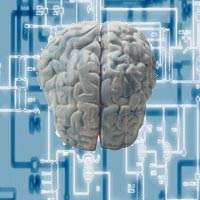Here are some quotes from "that" person...
I agree with much of what, "that" person, has to say...
Roger Penrose quotes, from
http://psyche.cs.mon...23-penrose.html
For those who are wedded to computationalism, explanations of this nature may indeed seem plausible. But why should we be wedded to computationalism? I do not know why so many people seem to be. Yet, some apparently hold to such a view with almost religious fervour. (Indeed, they may often resort to unreasonable rudeness when they feel this position to be threatened!) Perhaps computationalism can indeed explain the facts of human mentality - but perhaps it cannot. It is a matter for dispassionate discussion, and certainly not for abuse!
I find it curious, also, that even those who argue dispassionately may take for granted that computationalism in some form - at least for the workings of the objective physical universe - has to be correct. Accordingly, any argument which seems to show otherwise must have a "flaw" in it. Even Chalmers, in his carefully reasoned commentary, seeks out "the deepest flaw in the Gödelian arguments". There seems to be the presumption that whatever form of the argument is presented, it just has to be flawed. Very few people seem to take seriously the slightest possibility that the argument might perhaps be correct! This I certainly find puzzling.
We must ask whether it is conceivable that this mathematical community, or its individual members, could be entirely computational entities even though the ideal for which they strive is beyond computation.
What is important is the fact is that there is an impersonal (ideal) standard against which the errors can be measured. Human mathematicians have capabilities for perceiving this standard and they can normally tell, given enough time and perseverance, whether their arguments are indeed correct. How is it, if they themselves are mere computational entities, that they seem to have access to these non-computational ideal concepts? Indeed, the ultimate criterion as to mathematical correctness is measured in relation to this ideal. And it is an ideal that seems to require use of their conscious minds in order for them to relate to it.
.... might seem to some to be inappropriately "Platonistic", as they refer to idealized mathematical arguments as though they have some kind of existence independently of the thoughts of any particular mathematician. However, it is difficult to see how to discuss abstract concepts in any other way. Mathematical proofs are concerned with abstract ideas - ideas which can be conveyed from one person to another, and which are not specific to any one individual. All that I require is that it should make sense to speak of such "ideas" as real things (though not in themselves material things), independent of any particular concrete realization that some individual might happen to find convenient for them. This need not presuppose any very strong commitment to a "Platonistic" type of philosophy.
My contention is that without any genuine understanding on the part of the computer, it will (at least in most cases) eventually be found out, when subjected to sensitive enough questioning. Trying to simulate intelligent responses by having mountains and mountains of stored-up information, using the programmer's best attempts to assimilate all possible alternatives, would be hopelessly inefficient.
Likewise Moravec and McCarthy appear to belong to the "no big deal" school. McCarthy puts forward various suggestions for the circumstances under which he would consider that "consciousness" occurs. These are all within the computational model, so it is clear from this that I am not in agreement with him that his computer systems, acting according to his criteria, are actually conscious (in the sense that one could actually be such a system). Again, I fear that McCarthy does not appreciate the force of the logical arguments that I have given, which inform us that the quality of "understanding" cannot be accommodated within the computational model.
It is easy to suggest definitions within the computational model (as McCarthy does) of such things as "consciousness", "awareness", "self-awareness", "intentions", "beliefs", "understanding", and "free will". But such definitions need not convey to us (and do not convey to me) any conviction that the corresponding mental qualities that humans actually possess are in any real sense captured by computational definitions of this nature. As I have argued extensively above, the actual quality of human understanding cannot be captured within any purely computational scheme. So it is clear that I cannot be in agreement with all of McCarthy's definitions.




















































